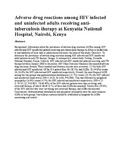| dc.description.abstract | Background: Information about the prevalence of adverse drug reactions (ADRs) among HIV infected and HIV uninfected patients receiving anti-tuberculous therapy in Africa is limited due to unavailability of local data or publications and hence the basis of this study.
Objective: To determine the prevalence of adverse drug reactions among HIV infected and HIV uninfected adult patients on anti-TB therapy.
Design: A retrospective cohort study.
Setting: Kenyatta National Hospital, Kenya.
Subjects: HIV infected and HIV uninfected patients receiving anti-TB therapy between January 2006 to December 2007
Main Outcome Measures:Documented adverse drug reactions.
Results: Three hundred and fourteen records were reviewed, 157 for both HIV infected and HIV uninfected. Of the 314 patient files, 96 (30.5%) had ADRs; 70 (44.6%) verses 26 (16.6%) for HIV infected and HIV uninfected respectively. Overall, the most frequent ADR among the two groups was gastrointestinal disturbances (21.7%) verses (10.2%) for HIV infected and uninfected respectively, (RR=2.44 [1.28-4.63], P=0.006). This was followed by peripheral neuropathy (16.6%) verses (4.5%) for HIV infected and uninfected respectively, (RR=4.25 [1.79-10.12], P=0.005). 73(46.49%) of the HIV infected patients were also receiving anti-retroviral therapy, of
which 36(49.31 %) of them had ADRs documented. Twenty five (29.8%) of the HIV infected who were not taking anti-retroviral therapy, had ADRs documented.
Conclusions: Gastrointestinal disturbances and peripheral neuropathy were the most common ADRs in both groups. Surveillance systems should be established in hospitals for ADRs monitoring and control. | en |

